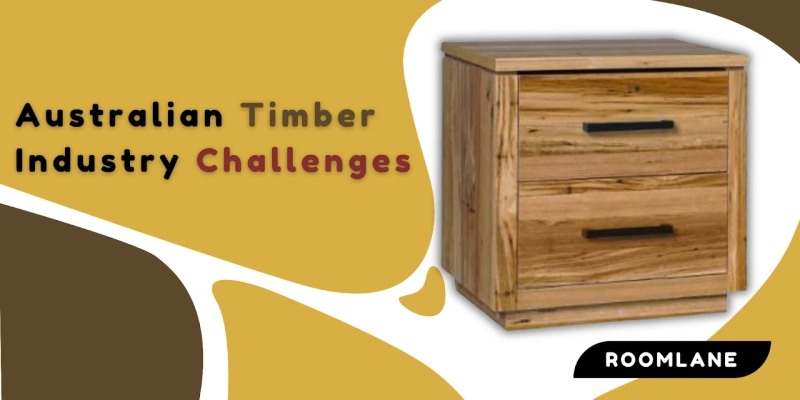Introduction
The Australian timber industry holds immense significance, not only for its economic contributions but also for its role in sustainable forestry and environmental conservation. This blog focuses on the key aspects of the Australian timber industry, including timber production, sustainable forestry practices, logging regulations, market demand, timber export, climate change impacts, and the challenges faced by the industry. We will also highlight the strong points of Roomlane, a leading furniture company that upholds sustainability and promotes Australian timber products.
Timber Production and Sustainable Forestry
Did you know that timber production in Australia is a vital sector that supports various industries and contributes to the country's economy? Bet you weren’t aware of how significant a role it plays in your life. Sustainable forestry practices play a crucial role in ensuring the long-term availability of timber resources. It is not only about economic progress but the preservation of nature too that ultimately benefits us. Through responsible forest management, including selective harvesting and reforestation efforts, the industry strives to maintain a healthy balance between timber production and environmental preservation. Isn’t that great how the timber is sourced without affecting nature marginally? Wouldn’t you want to be a part of it?
Logging Regulations and Environmental Protection
Australia has stringent logging regulations in place to safeguard its unique ecosystems and biodiversity. These regulations aim to prevent illegal logging, protect endangered species and habitats, and promote sustainable timber harvesting. Compliance with these regulations ensures the industry operates in an environmentally responsible manner, minimising negative impacts on ecosystems and promoting the conservation of natural resources. Thumbs up for such regulations and it is up to us to follow the rules for a better tomorrow.
Market Demand and Timber Export
The Australian timber industry caters to both domestic and international market demands. Timber products, renowned for their quality and durability, are widely used in construction, furniture making, and various other applications. The industry exports timber to numerous countries, contributing to Australia's trade balance. However, market fluctuations and changes in global demand pose challenges to the industry, requiring adaptation and innovation to maintain competitiveness.
Climate Change Impacts and Adaptation
The timber industry is not immune to the impacts of climate change. Rising temperatures, prolonged droughts, and increased frequency of extreme weather events can affect timber growth, forest health, and the overall productivity of the industry. Adapting to these changes requires implementing sustainable practices, supporting research and innovation, and embracing resilient timber species that can thrive in a changing climate. At Roomlane, most of the furniture is sourced from sustainable hardwoods and we are proud to be a part of this.
Skills and Workforce Development
Developing a skilled workforce is crucial for the sustainable growth of the timber industry. As the industry evolves, there is a need for expertise in sustainable forestry practices, timber processing, and value-added manufacturing. Investing in training and education programs helps equip individuals with the knowledge and skills necessary to navigate the industry's challenges and contribute to its long-term success. You would be surprised to know that a lot of timber can be saved from unnecessary wastage only if the workforce is skilled. The founders of Roomalne, with a robust 35 years experience in the furniture industry, ensure that the products are sourced with profound understanding and efficiency.
Roomlane's Commitment to Sustainability
Roomlane, a leading furniture company, recognises the importance of sustainable timber in the Australian timber industry. With a focus on offering high-quality, stylish, and sustainable furniture, Roomlane promotes the use of Australian timber species in its products. By sourcing timber from responsibly managed forests and supporting sustainable forestry practices, Roomlane upholds its commitment to environmental conservation and offers customers furniture options that align with their values. When you choose our furniture, you are actually buying a ticket to a greener planet.
Conclusion
The Australian timber industry plays a vital role in the country's economy and environmental conservation efforts. Through sustainable forestry practices, adherence to logging regulations, and adaptation to climate change impacts, the industry strives to balance timber production with environmental preservation. However, challenges such as market demand fluctuations and the need for a skilled workforce require ongoing innovation and collaboration. Roomlane, with its focus on sustainability and promotion of Australian timber products, contributes to the industry's growth and provides customers with high-quality furniture options. Together, the industry and conscious consumers can support a thriving and sustainable timber sector in Australia. The industry must adapt and implement resilient strategies to mitigate these risks while ensuring the long-term viability of the sector. Collaborative efforts among stakeholders, including government, industry, and environmental groups, are essential to address these challenges and promote a sustainable future for the Australian timber industry.
Remember, by choosing Roomlane, you not only bring quality and style into your home but also support sustainable practices and contribute to the preservation of Australia's timber resources.


